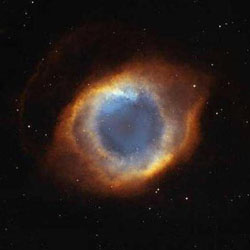 The Eye of God is actually the May 10, 2003 NASA Astronomy Picture of the Day, and depicts the planetary nebula created at the end of life of a sun-like star.
The Eye of God is actually the May 10, 2003 NASA Astronomy Picture of the Day, and depicts the planetary nebula created at the end of life of a sun-like star.
But mankind has dealt with this question before, and we are taught that there is a super-parent, a Primary Cause , a God , an all-knowing, all-controlling, being that orchestrates our life, and expects only that we exercise something that we call free will to guide our actions in a manner that we call good. The payoff for our good behavior is to escape what appears to be a permanent and eternal death, and an invitation to participate in an exquisite after-life. This satisfies our innate will to survive, which now seems to be under our control, a very comforting thought. For greater detail regarding the nature of this God, we are usually guided to a particular religious interpretation, or Faith, usually that of our parents. Doubts that we may later have regarding what we are expected to believe are often suppressed, for we face a long history, partly subliminal, of the benefits of pleasing our parents, and the discomfort of opposing them. Statistically speaking, the correlation of a person's faith to that of their parents is very strong. Of course, the existence of such a God, or even one less personal, cannot be proven by logical argument, but neither can His non-existence be shown. The same is true of establishing the truth of any given religious faith.
Given the strong correlation of one's Faith to that of their parents, one criticism of someone claiming to hold the True Faith is that God that must then appear to hold favorites, rewarding some through the accident of birth, but not others. Another criticism of Faith is that many Faiths exist that are in contradiction to one another, so how can one identify that faith which is true, given that no rational argument can be mounted in its support? One common response is "I have faith that my faith is the true faith", which simply invites a similar faith challenge at the "faith of faith" level. One should also be suspect of a faith's claiming God's Divine Revelation, recognizing that all such claims have, as their basis, a statement or writing by some human, with all their possible weaknesses and agendas. We possess no recordings of God's voice speaking to us directly, and while such claims or writings are remotely true in fact, the principle of Occam's Razor invites us to accept more reasonable explanations for such human claims.
A much stronger support of Faith, I believe, is that What is True might possibly be viewed from different, but unknowingly incomplete, perspectives that disagree. Yet each perspective, or faith, might, in fact, be a valid, if only partial, representation of What is True.
And, of course, there is the question of semantics in what we mean by the term God. Is it the very personal but punishing God of the Bible that seems to demand that we be God-fearing? Is it a personal, but more tolerant and loving God? Is it an impersonal God that simply guides the events that occur, paying no particular attention to our desires and our sufferings. Or is God simply a special kind of conscience, the sum total of all physical laws and feelings, those discovered, those possible to discover but yet undiscovered, and those forever beyond our capability to discover? Are we, in fact, all part of God in some connected way?
For many people, their model of reality includes some sort of God to fill in their remaining uncertain blanks, and remains fairly unchanged for their entire lifetime. This model enhances their sense of survival in the belief that there is a just answer for whatever impacts them. Everything seems taken care of, and they accept that whatever happens, good or bad, as God's will, over which they have little control, except, perhaps, by prayer.
Others, while accepting the existence of a God, may feel that He is too remotely involved, as so many things in life, especially its assignment of pain and suffering, seem so random in nature. Certainly, such assignments cannot be the product of a God who is just and loving, at least in our sense of what that means. Such individuals may still lead an admirable life judged by the human standards of what is good and bad. But they may not necessarily give much further thought to God, feeling that the role He plays is too unpredictable. Even atheists, who disbelieve in any form of God despite the fact that His non-existence is unproven, may live lives that are productive and caring.
Thus the participation and conscious influence of a God in one's model of reality can be of varying intensities, and it is unclear what effect, if any, a particular view has on one's purely social values and actions. One should live one's life without either fearing a God, or expecting any ultimate payoff for good behavior.